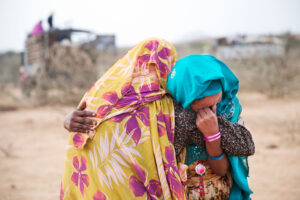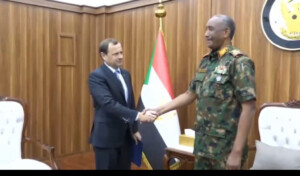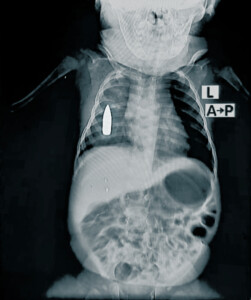Sudan timeline April-June 2020: Covid-19 marks all aspects of life, inflation soars
As in much of the rest of the world, the events in Sudan from April to June 2020 have been marked by the global coronavirus pandemic. The ailing Sudanese Pound has been placed under further stress in the current climate, and continues to fall against international currencies.
 Cartoon by Omar Dafallah (RD)
Cartoon by Omar Dafallah (RD)
As in much of the rest of the world, the events in Sudan from April to June 2020 have been marked by the global coronavirus pandemic. The ailing Sudanese Pound has been placed under further stress in the current climate, and continues to fall against international currencies.
As Sudan recorded its first cases of Covid-19, a raft of precautionary measures were introduced in the country, including curfews, and lockdowns beginning in Khartoum and spreading to other states.
The precautions led to the closure of Sudan’s borders and civil aviation. With travel restrictions and social distancing guidelines in place, the Sudan peace talks in Juba continued via video conferencing.
May saw an escalation of Covid-19 cases across the country placing already thinly-stretch healthcare facilities even further. Meanwhile incidents of violence continued to flare-up, especially across Darfur and South Kordofan.
June began with a border incident between Sudanese and Ethiopian troops. In a surprise development, former Darfur janjaweed leader Ali Kushayb, indicted for crimes against humanity by the International Criminal Court (ICC), was arrested in the Central African Republic, and transferred to the Hague.
On June 30, hundreds of thousands of people participated in the ‘March of the Millions‘ across Sudan to commemorate the protestors killed during the December uprising. PM Hamdok pledges to set transitional period ‘back on course’ as more leading members of the dissolved National Congress Party and the Islamic Movement were arrested in Khartoum.
Radio Dabanga carries ongoing daily coverage and comment on the situation in Sudan.
Timeline Sudan April-June 2020
April: Covid-19 spreads across Sudan, peace negotiations continue
April 1: The UN Security Council unanimously approved a resolution to extend the term of the UN-AU peacekeeping Mission in Darfur (Unamid) until the end of May. The Sudanese Pound continues its fall against hard currencies.
April 2: Sudan peace talks resume through videoconferencing. Sudan’s Prime Minister Abdallah Hamdok discusses with the US Secretary of State discuss the removal of the country from the US list of State Sponsors of Terrorism. The European Commission reiterates its support for the democratic transition in Sudan. Export of Sudanese vegetables and fruits stops because of increased transportation costs. Ousted President Omar Al Bashir, several of his military aides, and Islamist leaders are charged with ‘undermining the constitutional order‘ since 1989. South Darfur activists stage a protest against corrupt local authorities.
April 3: Sudan records the first case of Covid-19 infection through direct contact, bringing the number of confirmed coronavirus cases in the country to eight. The government opts for a gradual lockdown. Sudan’s annual inflation rate reached 71.3 per cent in February. The Anti-Corruption Committee* continues purging remnants of the former regime.

April 4: The Ministry of Industry and Trade decides to temporarily halt the export of sorghum to fill the country’s gap in staple food reserves.
April 5: Political parties and civil society groups voice support for PM Hamdok’s ‘Stand Up for Sudan‘ initiative. The Ministry of Infrastructure and Transport closes the Sudanese-Egyptian border in an attempt to ward off the spread of Covid-19.
‘Together we defeated the dictatorship and thus, together we can rebuild the country’ – PM Hamdok
April 6: The Sudanese government decides to appoint new employees in state governing bodies. A large number of people participate in demonstrations commemorating the start of the sit-in in front of the army command in Khartoum last year.
April 7: The government of Sudan pays out $70 million to relatives of the victims of the USS Cole bombing in 2000. Khartoum will assess poor families for support in case of a Covid-19 lockdown. Two ships carrying 80,000 tons of diesel arrive in Port Sudan to alleviate the fuel crisis in the country.
April 9: The Sudanese Pound hits a new low on the parralel market. The Court of Appeal refuses to acquit Al Bashir of two-years imprisonment for corruption.
April 10: Sudan reports its 15th coronavirus case. The South Sudan mediation team sets May 9 as new deadline for the Sudanese peace negotiations. More doctors in East Darfur lay down their tools after police refuses to accept a complaint against militiamen of the Rapid Support Forces. Supporters of ousted President Al Bashir demonstrate in Khartoum against the new government.
April 12: The government plans a three-week lockdown in the country. South Darfuri protest the ongoing fuel shortages.

April 13: Al Bashir supporters demonstrate again in Khartoum. PM Hamdok issues an emergency order that criminalises attacks on health personnel.
April 14: The authorities decide to impose a lockdown in Khartoum, effective from April 18. Prices for the US Dollar and gold on the parallel market are soaring.
April 15: More than 30 coronavirus cases are recorded in Sudan. The Sudan Revolutionary Front (SRF) rebel alliance rejects the government matrix detailing responsibilities for the transitional period.
April 16: Khartoum raises the minimum wage in the country by 700 per cent.
April 17: PM Hamdok dismisses the governor of Khartoum because he refuses to ban group prayers in mosques. The Council of Ministers decides to take ‘firm action’ against pro-Al Bashir demonstrators.
April 19: Sudan’s anti-graft authority seizes 390 plots of prime Khartoum real estate.
April 20: Khartoum’s new governor threatens to tighten lockdown. The Sudanese peace talks resume through teleconferencing. The rebel groups reject the appointment of civilian governors before a peace accord is reached. Lt Gen Abdelfattah El Burhan, Chairman of Sudan Sovereign Council, says the country’s army ‘will safeguard the revolution‘.
April 21: Cooking gas and bread shortages in the country put anti-Covid-19 social distancing under pressure. The Khartoum airport shutdown is extended to May 20. A shortage of Personal Protection Equipment prompts many doctors to stay at home for fear of contracting Covid-19. The SRF rebel alliance sets new standards for the selection of civilian state governors.
April 22: Khartoum provides support to groups most affected by the coronavirus lockdown. Precautionary measures taken to prevent the spread of the coronavirus in Delgo, Northern State, leads to violent demonstrations.
April 23: Unamid donates material to the Ministry of Health as support in the fight against the Covid-19 pandemic. Medics in Khartoum call for unhindered movement between their homes and hospitals.
April 24: The Sudanese government and the SRF rebel alliance agree on the addition of four seats to the Sovereign Council in favour of ‘the Darfur peace bloc’. The Anti-Corruption Committee seizes assets illegally acquired by leading Islamists. Sudan and South Sudan mourn the death of prominent politician and thinker Mansour Khalid.
April 26: UN Under-Secretary-General for Political and Peacebuilding Affairs Rosemary DiCarlo calls on the UN to ‘do everything we can to support the transition‘ in Sudan. Under-Secretary-General for UN Peace Operations, Jean-Pierre Lacroix, says the UN is ‘fully mobilised‘ to continue supporting the Sudanese people.
April 27: Khartoum and the armed movements agree that 40 per cent of the natural resources in Darfur will be allocated to the region itself. The authorities in eastern Sudan’s El Gedaref impose a full lockdown in the town.
April 28: A joint European-US delegation visits Khartoum and urges the formation of a legislative council to iron out outstanding issues in the peace talks. UN High Commissioner for Human Rights Michelle Bachelet warns that untold suffering awaits Sudan unless donors act fast.
April 29: The Sudanese government decides to criminalise female genital mutilation (FGM). The coronavirus reaches ten of Sudan’s 18 states. In total 318 people have been infected, according to the federal Health Ministry.
April 30: The African Union says it will continue to support Sudan to reach a sustainable peace. 12 young people protesting against fraudulous activities of the Zakat Chamber in South Darfur are detained. Prices of locally made medicines double. Food prices of food are soaring again.
May: Tribal clashes increase in the country, Sudanese suffer from the lockdown
May 1: Army soldiers and paramilitaries of the Rapid Support Forces are deployed in Khartoum to enforce the Covid-19 lockdown. The police arrests supporters of Omar Al Bashir, protesting his imprisonment. Policemen in Khartoum are accused of selling cooking gas. Medics condemn the soaring medicine prices. Large parts of Khartoum are short of drinking water.

May 3: Khartoum and the Sudan People’s Liberation Movement-North headed by Malik Agar, agree to integrate the rebel fighters, into the military, police, and security apparatus. Deputy Chairman of the Sovereign Council, Lt Gen Mohamed Hamdan ‘Hemeti’, and Tut Galuak, Security Advisor to the South Sudanese president discuss the growing insecurity in Abyei.
May 4: On the occasion of World Press Freedom Day, PM Hamdok states that press freedom in Sudan is still below the standards set by the new government.
May 5: El Gezira University dissolves the corrupt Institute for Islamic Knowledge. PM Hamdok and South Sudan President Salva Kiir discuss the security situation in Abyei.
May 6: The Khartoum curfew will be extended. The Rapid Support Forces prevent sugar, flour, and fuel from being smuggled to ‘a neighbouring country’.
May 7: The growing number of coronavirus cases burden the already worn-out health services in Sudan. Dozens are killed in South Darfur tribal clashes. Sudanese activists urge Hamdok to add ‘physical protection’ to his request for a new UN force to be deployed in the country.
May 8: Unamid, UN sign financial deal to support Sudan in its fight against Covid-19.
May 10: The lockdown in Sudan is extended with 10 days.
May 11: Sudan army, RSF militia are tasked to collect illegal arms. Eight people die in tribal fighting in eastern Sudan’s Kassala.
May 12: Residents of Nierteti in Central Darfur protest against the deteriorating security situation in the area. The Sudanese Security and Defence Council discusses solutions for the widespread violence in the country.
May 13: More than 15 people are killed in clashes at the Grand Market of Kadugli in South Kordofan. The RSF detains 242 South Darfur tribesmen suspected to be involved in recent fighting. Khartoum takes more measures to ward off the spread of Covid-19.
May 14: Warring South Darfur tribesmen sign a truce. Leaders of Nuba and Beni Amer tribes in Kassala propose mediation. Nurses in Sudan demand protection against Covid-19.
May 15: The African Centre for Justice and Peace Studies (ACJPS) condemns human rights violations by Sudan’s armed forces. Militiamen kill five people in the South Kordofan capital Kadugli. Nine militiamen are killed in ‘army attack’ near Kadugli. Sudan will establish a mechanism to manage properties recovered by the Anti-Corruption Committee. People in Port Sudan, Red Sea state, worry about the dire conditions in the city’s Covid-19 isolation centres.

May 17: The inflation rate in Sudan reached 98.81 per cent in April. A Cessation of Hostilities is signed between various native administration leaders and the Forces for Freedom and Change in South Kordofan.
May 18: The deadline for Sudan peace talks is postponed again, to June 20.
May 19: The Covid-19 lockdown is extended for two weeks. The chairman of Sudan’s Sovereign Council and the head of Unamid discuss the situation in Darfur. South Sudanese refugees are attacked by horsemen in West Kordofan.
May 20: Mortality rates increase dramatically in El Fasher, capital of North Darfur. Registered coronavirus cases in Sudan double in two weeks. Queues in front of ATM’s are growing as the daily withdrawal maximum has been reduced from SDG 5,000 ($91 according to the Central Bank of Sudan) to SDG 2,000.
May 21: The Sudanese peace talks continue despite a split in the SRF rebel alliance. More than 3,100 Covid-19 patients are recorded in Sudan. Medics call for protection. Eastern Sudan’s Kassala will establish more police posts in the town.
May 22: Peace talks parties reach an accord on revenue-sharing in southern Sudan. Doctors announce a strike in all hospitals in Sudan for a period of 72 hours, after four medics were attacked in Omdurman.
May 24: Sudan’s Minister of Health acknowledges that “the actual number of Covid-19 cases is higher than the official data”. Sudanese express their frustrations after more than a year without any prospects on accountability for the ‘June 3 massacre‘. The Anti-Corruption Committee will file new complaints against deposed President Al Bashir. The Ministry of Foreign Affairs says that removal of the country from US terror list is ‘a matter of time’.
May 25: At least 14 people are killed in Central Darfur tribal fighting. Hundreds of people violate Covid-19 measures and perform Eid El Fitir prayers in public places. A demonstration in Omdurman commemorating the first anniversary of the Khartoum sit-in massacre is violently dispersed by the police. PM Hamdok pledges that the perpetrators of the ‘June 3 massacre‘ will be held accountable.
May 26: Prices of basic commodities are soaring across Sudan. People in several states complain about the deterioration of health services, as Covid-19 stretches the capacity of the country’s health care system. The commander of the paramilitary Rapid Support Forces says his troops are ‘protecting the people‘.
May 27: Unprecedented mortality rates in Sudan, especially among the elderly, are attributed to the coronavirus pandemic, the poor health care, and shortages of medicines. According to Lt Gen Abdelfattah El Burhan, chairman of the Sovereign Council and commander-in-chief of the Sudanese army, the Unamid peacekeeping mission in Darfur will end in October. The Sudanese Congress Party calls for the replacement of civilian members of the Sovereign Council and the government.
May 28: The UN Office to Combat Terrorism and Khartoum sign a Memorandum of Understanding.
May 29: Ethiopian gunmen kill a Sudanese army officer in El Gedaref.
May 31: According to PM Hamdok, partisan politics form a major obstacle for the transitional government. Minni Minawi, who split from the SRF in May, meets with other leaders of the new Sudan rebel alliance.
June: Janjaweed leader arrested, UNSC decides to send a new mission to Sudan
June 1: Ethiopia denies hostility with Khartoum after border incident in which a Sudanese army captain was killed. Sudanese civil society organisations call for reforms in the country, including separation between religion and state. The United Doctors Office welcomes a new law that will protect medics in Sudan.
June 2: Sudanese peace talks resume with high hopes. Khartoum extends the coronavirus lockdown for another two weeks. At least 5,000 people are displaced by the Sudan-Ethiopia border violence.
June 3: Three women are killed in fighting between Sudan army solders and Darfur rebel fighters in Jebel Marra. Drinking water outages in Port Sudan and Khartoum lead to street protests. The new Minister of Defence is sworn in in Khartoum.
June 4: Many public and private hospitals in the country are closed due to a shortage of medical staff. PM Hamdok says that the violent dismantling of the sit-in on June 3, 2019, constitutes a criminal act against the Sudanese people. The Sudan Liberation Movement under the leadership of Abdelwahid El Nour (SLM-AW) denies attacks on army forces in Jebel Marra. Four people are wounded in a militia raid of a village in North Darfur’s El Sareif locality.
June 5: The UN Security Council agrees to set up a UN Integrated Transition Assistance Mission in Sudan (Unitams). The mandate of Unamid is extended until December 31. The number of recorded Covid-19 cases in the country reaches 5,714. Unamid continues to support Sudanese health authorities in various fields. The Sudanese government commemorates the June 3 massacre. Staple food prices continue to increase.
June 7: Hamdok says that the return of the millions of displaced people in the country are a major challenge for the government.

via video link (ICC Video)
June 8: The Sudanese government and the rebel movements reach an agreement on the general elections. The Popular Defence Forces government militia is dissolved.
June 9: Former Darfur janjaweed leader Ali Kushayb, indicted for crimes against humanity by the International Criminal Court (ICC), is arrested in the Central African Republic, and transferred to the Hague. Tribal strife flares in West Kordofan and in El Gezira. South Darfur authorities confiscate illegal weapons.
‘Ending impunity for atrocity crimes is also essential to achieve durable peace and security in Darfur’ – ICC Prosecutor Fatou Bensouda
June 10: Khartoum hosts a meeting between Ethiopia, Egypt, and Sudan about the Grand Renaissance Dam Addis Ababa is building in the Blue Nile. Prominent Islamic leader Ahmed Abdelrahman is detained on charges of involvement in the 1989 military coup. The Sudanese Anti-Corruption Committee seizes funds and real estate from several money transfer companies in the country.
June 11: The Sudanese government lauds the arrest of Kushayb, and says it will discuss the extradition of the other ICC suspects. Calm returns to West Kordofan’s Lagawa after tribal clashes last week. Supporters of the Al Bashir regime demonstrate in Khartoum. The US Commission on International Religious Freedom hails Sudan for progress on religious freedom.
June 12: Sudan’s peace talks discuss Darfur security arrangements. Three people are killed, two others are abducted in Darfur. European Covid-19 aid arrives in Sudan.
June 14: Sudan’s anti-corruption committee calls for 2019 audit reports. The Health Ministry reports more than 7,000 Covid-19 cases in the country.
June 15: The Ministry of Finance will provide direct cash support to vulnerable families. Former janjaweed leader Ali Kushayb makes his first appearance before an ICC judge in the Hague. Unamid sends reinforcements to Kalma camp for the displaced in South Darfur to prevent escalation after two people were killed last week. Trials of leaders of the 1989 coup will begin soon. The about 12,000 people who fled their homes during last month’s violence in the South Kordofan capital are living in ‘an extremely abject situation’. The New-York based African Centre for Justice and Peace Studies expresses its concern over ‘the surge of targeted attacks against civilians in Darfur‘.
June 16: Dozens of bodies, allegedly belonging to students who fled military service in 1998, are found buried in Khartoum. Sudan’s Attorney General says that the remaining ICC suspects may not have to stand trial in The Hague.
June 17: Darfuri commemorate the execution of 79 people in Mukjar in 2004, allegedly ordered by Ali Kushayb, now in ICC custody. Displaced in Kabkabiya in North Darfur protest the ongoing violence in the camps.
June 18: The lockdown in Khartoum is extended until June 29. Inflation surged 114 per cent in May, Sudan’s economic woes deepen.
June 19: Nuba and Misseriya leaders in West Kordofan sign a reconciliation agreement. Darfur lawyers urge tribal leaders to adopt ‘community solutions for societal recovery’.
June 22: According to the Sudanese government, the peace negotiations near conclusion.
June 23: The Sudan Armed Forces report they pushed back an attack of the Ethiopian army in El Gedaref.

and Swedish Ambassador Hans Henric Lundqvist at Khartoum Airport
when the EU Covid-19 aid flight arrived (EU / Ala Kheir)
June 24: Another European Covid-19 aid flight arrives in Khartoum. Unamid calls on Darfur rebel factions to stop fighting in Jebel Marra. The International Crisis Group calls on donors to finance a cash transfer programme to offset price rises following Khartoum’s decision in January to lift fuel subsidies.
June 25: US Secretary of State Mike Pompeo expects a deal with the Sudanese government on the victims of the 1998 bombings of the American embassies in Kenya and Tanzania will be reached in the coming weeks.
June 26: International partners pledge to support Sudan economic reforms with $1.8 billion. Satellite images provided by Lighthouse Reports show visible destruction in Darfur linked to RSF militia attacks. South Sudanese mediators and negotiators of the SRF rebel alliance arrive in Khartoum for direct peace talks with the Sudanese government on outstanding issues.
June 28: Relatives of people killed during the December Revolution demand justice in a memorandum to the Sovereign Council and the Council of Ministers. The committee investigating the violent dispersal of the Khartoum sit-in on June 3 says it will round up their work within three weeks.
June 29: The Covid-19 lockdown in Khartoum is extended to July 7, after which the restrictions will gradually be eased. People in Central Darfur’s Nierteti set up a sit-in in protest against the rampant insecurity in the locality. Sudan’s High Peace Council and the PM agree on proposals for six outstanding issues in the peace negotiations. Dozens of people are killed in a dispute over land in Talodi in South Kordofan. Police storm the prison of Kassala in eastern Sudan because of riots after four inmates were tested positive for Covid-19.
June 30: Hundreds of thousands of people participate in the ‘March of the Millions‘ across Sudan to commemorate the protestors killed during the December uprising. PM Hamdok pledges to set transitional period ‘back on course’. Nine leading members of the dissolved National Congress Party and the Islamic Movement are arrested in Khartoum. The Nierteti sit-in demanding security continues.
* The full name of the committee is Empowerment Elimination, Anti-Corruption, and Funds Recovery Committee. Empowerment (tamkin) is the term with which the ousted government of Omar Al Bashir supported its affiliates in state affairs by granting them far-going privileges, including government functions and the setting-up of various companies.
Previous timelines:
Sudan timeline Jan-March 2020: Little relief to the country’s economic, security woes
Sudan timeline Oct-Dec 2019: Interim government put to the test
Sudan timeline July-Sept 2019: Turbulent transformation from tyranny
Sudan uprising: Timeline of tumultuous change (August 2019)
How did civil discontent propel Sudan towards the overthrow of Al Bashir? (May 2019)
Radio Dabanga’s editorial independence means that we can continue to provide factual updates about political developments to Sudanese and international actors, educate people about how to avoid outbreaks of infectious diseases, and provide a window to the world for those in all corners of Sudan. Support Radio Dabanga for as little as €2.50, the equivalent of a cup of coffee.










 and then
and then